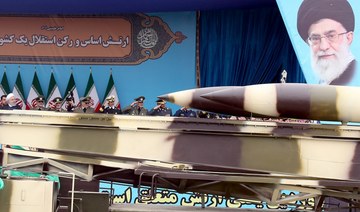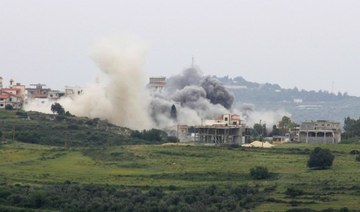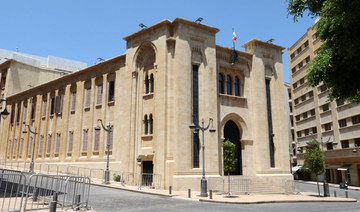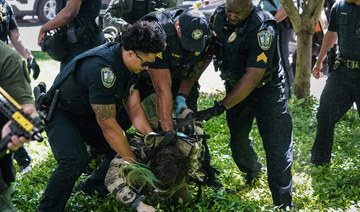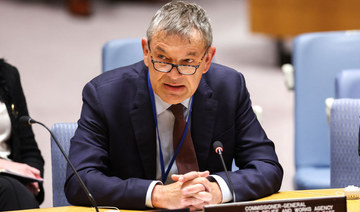DUBAI: Top officials in Iran say the upcoming US election doesn’t matter, but nearly everyone else there seems to be holding their breath.
The race for the White House could mean another four years of President Donald Trump’s “maximum pressure” campaign. Or it could bring Joe Biden, who has raised the possibility of the US returning to Iran’s 2015 nuclear deal with world powers.
In the upper levels of Iran’s Islamic republic, overseen by 81-year-old Supreme Leader Ayatollah Ali Khamenei, anti-Americanism is as deeply entrenched as at any time since the 1979 Islamic revolution, with presidents from both parties seen as equally repugnant.
“America has a deep-rooted enmity against the Iranian nation and whether Trump is elected or Biden, it will not have any impact on the US main policy to strike the Iranian nation,” parliament speaker Mohammad Bagher Qalibaf said in September, according to the semiofficial Fars news agency.
But noticeably, Khamenei himself hasn’t commented on the election, even as public interest has soared. State-run radio rebroadcast a BBC Farsi-language service simulcast of the presidential debates live — even as Iran continues to target journalists for the British broadcaster.
That interest allegedly includes Iran’s security apparatus as well. US officials accuse the Islamic republic of sending emails to voters seeking to intimidate them into voting for Trump. It may have been an attempt to link the president to apparent election interference in order to sow chaos, like Russia’s interference in America’s 2016 election. Tehran denies being involved.
The Iranian public is paying attention. The state-owned polling center ISPA said this month that 55 percent of people believe the outcome of the election will affect Iran “a lot.” Over half expected Trump would win, while a fifth said Biden. ISPA said it surveyed over 1,600 people by telephone, and did not provide a margin of error.
Trump’s reelection would mean the extension of his pressure campaign, including sanctions on Khamenei and other senior officials. Some of the sanctions are largely symbolic — Khamenei has only once traveled to America and does not hold any US bank accounts — but others have devastated the economy and sent the local currency into freefall. As a hedge, Iranians have poured money into foreign currency, real estate, precious metals and the stock market — which hit a record high in August.
Trump on the campaign trail has hit on that and his decision to launch a drone strike that killed a top Iranian general in January — a move that led Tehran to launch a retaliatory ballistic missile strike, wounding dozens of American troops.
To cheers, Trump has described the general, Qassem Soleimani, as “the world’s No. 1 terrorist,” likely due to him being blamed for the improvised explosive devices that maimed US troops in Iraq and for supporting Syria’s Bashar Assad. Many Iranians revered Solemani for fighting against Daesh and in the Iran-Iraq war in the 1980s, and millions flooded the streets for his funeral processions.
“The first call I get when we win will be from the head of Iran, let’s make a deal. Their economy is crashing,” Trump told a campaign rally in Allentown, Pennsylvania, on Monday. “They will call and I want them to do well, but they cannot have a nuclear weapon.”
Biden has left open the possibility of returning to the nuclear deal, in which Tehran agreed to limit its uranium enrichment in exchange for the lifting of economic sanctions. The other signatories — Britain, France, Germany, Russia and China — have remained committed to the agreement and allowed a UN arms embargo to expire as part of the deal, despite a White House push to keep it in place.
After Trump withdrew from the deal in 2018 and restored crippling sanctions, Iran began publicly abandoning the agreement’s limits on enrichment. It now has at least 2.32 tons of low-enriched uranium, according to a September report by the International Atomic Energy Agency (IAEA). Experts typically say 1.15 tons of low-enriched uranium is enough material to be re-enriched for one nuclear weapon.
Iran insists its nuclear program is peaceful and still allows IAEA inspectors to monitor its atomic sites. But experts say the “breakout time” needed for Iran to build one nuclear weapon if it chooses to do so has dropped from one year under the deal to as little as three months.
Iran in the past also has threatened to abandon a nuclear nonproliferation treaty or expel international inspectors. It recently began construction at an underground nuclear site, likely building a new centrifuge assembly plant after a reported sabotage attack there earlier this year.
“’America First’ has made America alone,” Biden said at a televised ABC town hall this month, playing on a longtime Trump slogan. “You have Iran closer to having enough nuclear material to build a bomb.”
What a return to the deal means, however, is in question. Biden’s campaign website says he would use “hard-nosed diplomacy and support from our allies to strengthen and extend it.” One criticism of the accord was its narrow focus on the nuclear program, despite concerns by the US, Israel and its Gulf Arab allies over Iran’s ballistic missile program and its presence in Iraq, Lebanon and Syria.
Iran maintains that its ballistic missile program is vital for deterring potential attacks and non-negotiable. It is also unlikely to cease its military activities in Syria and Iraq, where it spent considerable blood and treasure in the war against Daesh.
But ensuring the survival of the Islamic republic, particularly amid the coronavirus pandemic, may require the same flexibility that saw Iran agree to negotiations with the US in the first place. Iran will hold a presidential election in June, but any decision to re-engage with Washington would have to be made by the supreme leader.
“Khamenei’s revolutionary path actually leads to America — that is, by seeking a stable, safe, and meticulously measured relationship with the United States, he believes he can guarantee the survival of both the regime and its revolutionary content and orientation,” wrote Mehdi Khalaji, a Qom-trained Shiite theologian who is an analyst at the Washington Institute for Near East Policy.
“Tehran’s objective is therefore a scandalous paradox: Deal with America to remain anti-American.”
Iranians awaiting US election results with bated breath
https://arab.news/wwhtc
Iranians awaiting US election results with bated breath
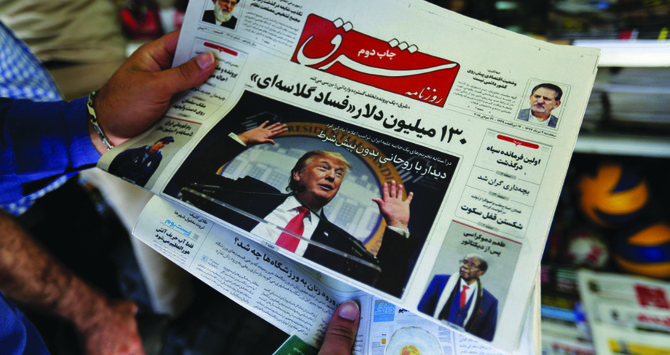
- Khamenei himself hasn’t commented on the election, even as public interest has soared
150 shells hit Lebanese border towns in response to Israeli’s killing
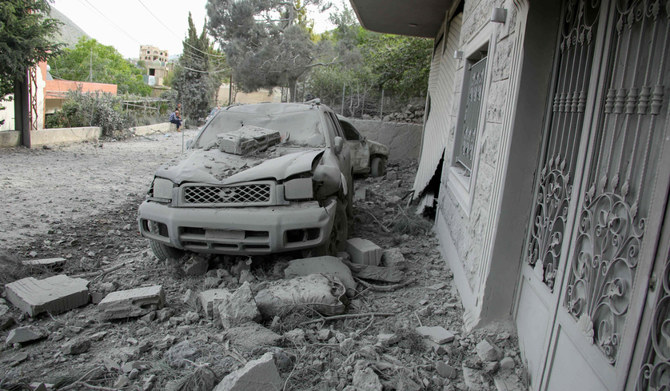
- 200 days of Israeli attacks against Lebanon have resulted in 1,359 casualties, including 344 deaths, ministry of health says
BEIRUT: The Israeli army responded on Friday to the combined operation carried out by Hezbollah in the occupied Shebaa Farms district — also known as Har Dov — with artillery shelling and airstrikes targeting the Tumat Niha area on the outskirts of Western Bekaa.
An Israeli was killed near the country’s northern border in a Hezbollah attack.
Israeli forces launched an airstrike on the outskirts of Shebaa and fired artillery shells on the outskirts of the town of Kfarchouba at dawn.
The outskirts of Shebaa, Kfarchouba and Helta were targeted with more than 150 Israeli shells.
Hezbollah members set up on Thursday night a “combined ambush of guided missiles, artillery, and rocket weapons targeting an Israeli motorized convoy near the Ruwaizat Al-Alam site, in the occupied Lebanese Kfarchouba hills.”
When the convoy arrived at the ambush point, according to Hezbollah’s statement, “it was targeted with guided weapons, artillery and rockets, destroying two vehicles.”
The party said that the Israeli army created a “smokescreen to retrieve losses.”
Hezbollah announced “targeting an Israeli force as it made it to the entrance of Al-Malikiyah site with artillery fire, and it was directly hit.”
The Israeli army confirmed the killing of a truck driver, Sharif Sawaed — a resident of Wadi Salameh — by an anti-tank shell fired by Hezbollah toward Shebaa Farms.
The Israeli army said that Sawaed was carrying out infrastructure work in the area targeted by the shell, where efforts are underway to set up a barrier on the border.
The Israeli army said that it “succeeded in retrieving the body of the dead soldier after a complex operation that lasted for hours under fire.”
The Israeli army said that warplanes later shelled Hezbollah positions in the villages of Kfarchouba and Ain Al-Tineh, a weapons depot, and a Hezbollah rocket launch pad in the Markaba area in southern Lebanon, and that two anti-tank shells were observed from Lebanese territory toward Shebaa Farms.
Israeli airstrikes led to the destruction of a house in Shebaa, two houses in Kfarchouba, and damage to more than 35 houses. One house was destroyed in Yarine, and another was destroyed in Dhayra.
Israeli artillery shelling targeted the area between the border towns of Yarine and Jebbayn.
Israeli newspaper Yedioth Ahronoth reported that the Israeli army launched an investigation into the Har Dov incident, as the engineering force was supposed to operate in the dark to avoid being targeted by Hezbollah’s missiles.
Israeli army spokesperson described what happened in the Shebaa Farms as “a difficult security incident on the Lebanese border.”
This was the first confrontation during which the Israeli army revealed details of casualties and the developments taking place at the target site.
The head of the Israeli Metula settlement council said: “It is insane how we lose houses and infrastructure every day,” adding that “Hezbollah is systematically and deliberately hurting the people of the north by doing so.”
He said that Hezbollah had “successfully deepened the security belt here after it made us flee the northern settlements.”
The Israeli army’s radio station has reported the death of 20 settlers on the Lebanese border since the start of the war more than 200 days ago.
An Israeli military drone struck a car on the Dhahira–Zalloutieh road in the border region.
The Israeli attacks against Lebanon, which have continued for 200 days, resulted in “1,359 casualties, including 344 dead people, most of whom are men,” according to a report published by the Lebanese Ministry of Health.
Israeli media outlets stated that “4,000 missiles were launched toward northern Israel from Lebanon since the beginning of the Gaza war, according to the Israeli army’s estimations.”
Hezbollah provided a detailed overview of the course of the military operations on the Lebanese southern border, stating that “it killed and wounded 2,000 Israeli soldiers, and carried out 1,650 diverse attacks, including downing five drones and targeting 67 command centers and two military factories.”
The group added that it carried out 55 aerial attacks and forced 230,000 settlers to evacuate 43 northern settlements.
Lawyer for arrested Palestinian academic warns move could set ‘precedent’ for free speech in Israel
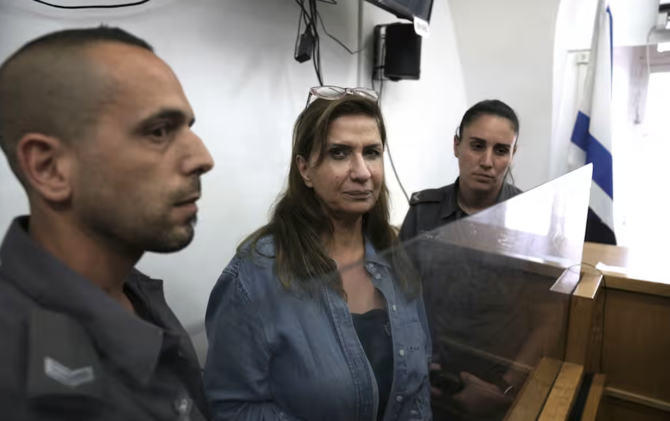
- Nadera Shalhoub-Kevorkian was detained for appearing on podcast to discuss state violence, genocide
- Hundreds of Palestinian citizens of Israel have been detained since Oct. 7 over criticism of Israel
LONDON: The lawyers for a Palestinian legal scholar arrested on April 17 have said her detention was “political” and could set a “precedent” for the treatment of academics and free speech in Israel.
Prof. Nadera Shalhoub-Kevorkian, a leading feminist academic with roles at the Hebrew University of Jerusalem and Queen Mary, University of London, was arrested after appearing on a podcast in March in which she discussed her work on state crimes, genocide, violence and surveillance in the context of the war in Gaza.
She was strip-searched by police, interrogated and denied access to food, water and medication for several hours, and held in a cold cell overnight before being bailed the next day. A number of her personal items, including posters and books, were also confiscated.
Hassan Jabareen, her lawyer and director of human rights organization Adalah, said: “This is not only about one professor, it could be a (precedent) for any academic who goes against the consensus in wartime.”
Israeli police claimed that she was being investigated on suspicion of incitement to terrorism, violence and racism, but a magistrate deemed she did not pose a threat after she was arrested, leading to her release.
Hundreds of Palestinian citizens of Israel have been arrested since the outbreak of hostilities after Oct. 7, with many detained for criticism of Israel.
All arrests in relation to freedom of speech issues must be signed off by Israel’s attorney general, and Shalhoub-Kevorkian has been ordered to return to face further questioning at the weekend.
Jabareen said: “They could have asked her to come to the police station for two or three hours to discuss, investigate.
“To carry out the arrest like that, as if she was a dangerous person, shows the main purpose was to humiliate her.
“It was illegal, that’s why the magistrates court accepted my argument that she should be released and the district court confirmed it.”
She added: “If they indict her, this might have a deeply chilling effect. It’s very difficult to prosecute a person for academic work … but the political situation in Israel is starting to not really be based on the rule of law.”
International academics have condemned Shalhoub-Kevorkian’s arrest and treatment, with over 100 colleagues from the Hebrew University of Jerusalem publishing a letter in support of her.
In addition, 250 academics at Queen Mary have signed a separate letter saying: “Academic freedom (in Israel) has come under sustained attack.”
In the Hebrew University academics’ letter, published by Israeli newspaper Haaretz, her colleagues said: “Regardless of the content of Nadera’s words, their interpretation and the opinions she expressed, it is clear to everyone that this is a political arrest, the whole purpose of which is to gag mouths and limit freedom of expression. Today it is Nadera who stands on the bench, and tomorrow it is each and every one of us.”
The Hebrew University also issued a short statement of support, despite the fact that in 2023 she was briefly suspended and asked to resign by the university’s rector after she called for a ceasefire in Gaza and suggested Israel could be guilty of genocide.
“We strongly object to many of the things that Prof. Shalhoub-Kevorkian said. Nonetheless, as a democratic country, there is no place to arrest a person for such remarks, however infuriating they may be,” it said.
Gaza baby rescued from dead mother’s womb dies

- Doctors were able to save the baby, delivering her by Caesarean section
- The baby suffered respiratory problems and a weak immune system, said Doctor Mohammad Salama who had been caring for Sabreen Al-Rouh
RAFAH, Gaza Strip: A baby girl who was delivered from her dying mother’s womb in a Gaza hospital following an Israeli airstrike has herself died after just a few days of life, the doctor who was caring for her said on Friday.
The baby had been named Sabreen Al-Rouh. The second name means “soul” in Arabic.
Her mother, Sabreen Al-Sakani (al-Sheikh), was seriously injured when the Israeli strike hit the family home in Rafah, the southernmost city in the besieged Gaza Strip, on Saturday night.
Her husband Shukri and their three-year-old daughter Malak were killed.
Sabreen Al-Rouh, who was 30-weeks pregnant, was rushed to the Emirati hospital in Rafah. She died of her wounds, but doctors were able to save the baby, delivering her by Caesarean section.
However, the baby suffered respiratory problems and a weak immune system, said Doctor Mohammad Salama, head of the emergency neo-natal unit at Emirati Hospital, who had been caring for Sabreen Al-Rouh.
She died on Thursday and her tiny body was buried in a sandy graveyard in Rafah.
“I and other doctors tried to save her, but she died. For me personally, it was a very difficult and painful day,” he told Reuters by phone.
“She was born while her respiratory system wasn’t mature, and her immune system was very weak and that is what led to her death. She joined her family as a martyr,” Salama said.
More than 34,000 Palestinians, many of them women and children, have been killed in the six-month-old war in Gaza between Israel and Hamas militants, according to the Gaza health ministry. Israel denies deliberately targeting civilians in its campaign to eradicate Hamas.
Much of Gaza has been laid to waste by Israeli bombardments and most of the enclave’s hospitals have been badly damaged, while those still operating are short of electricity, medicine sterilization equipment and other supplies.
“(Sabreen Al-Rouh’s) grandmother urged me and the doctors to take care of her because she would be someone that would keep the memory of her mother, father and sister alive, but it was God’s will that she died,” Salama said.
Her uncle, Rami Al-Sheikh Jouda, sat by her grave on Friday lamenting the loss of the infant and the others in the family.
He said he had visited the hospital every day to check on Sabreen Al-Rouh’s health. Doctors told him she had a respiratory problem but he did not think it was bad until he got a call from the hospital telling him the baby had died.
“Rouh is gone, my brother, his wife and daughter are gone, his brother-in-law and the house that used to bring us together are gone,” he told Reuters.
“We are left with no memories of my brother, his daughter, or his wife. Everything was gone, even their pictures, their mobile phones, we couldn’t find them,” the uncle said.
UN denounces ‘more serious’ Iran crackdown on women without veils

- Hundreds of businesses including restaurants and cafes have been shut down for not enforcing the hijab rule
- More women began refusing the veil in the wake of the 2022 death in custody of 22-year-old Mahsa Amini
GENEVA: The United Nations said Friday that it was concerned by reports of new efforts to track and punish Iranian women, some as young as 15, who refuse to wear the headscarf required under the country’s Islamic law.
The UN Human Rights Office also expressed alarm about a draft bill on “Supporting the Family by Promoting the Culture of Chastity and Hijab,” which would impose tougher sentences on women appearing in public without the hijab.
“What we have seen, what we’re hearing is, in the past months, that the authorities, whether they be plainclothes police or policemen in uniform, are increasingly enforcing the hijab bill,” Jeremy Laurence, a spokesman for the office, said at a press conference.
“There have been reports of widespread arrests and harassment of women and girls — many between the ages of 15 and 17,” he said.
Iranian police announced in mid-April reinforced checks on hijab use, saying the law was increasingly being flouted.
Hundreds of businesses including restaurants and cafes have been shut down for not enforcing the hijab rule, and surveillance cameras are being used to identify women without it, Laurence said.
More women began refusing the veil in the wake of the 2022 death in custody of 22-year-old Mahsa Amini after her arrest by Iran’s morality police for allegedly breaking the headscarf law, which sparked a wave of deadly protests against the government.
Laurence said that on April 21, “the Tehran head of the Islamic Revolutionary Guard Corps announced the creation of a new body to enforce existing mandatory hijab laws, adding that guard members have been trained to do so ‘in a more serious manner’ in public spaces.”
And while the latest draft of the new hijab bill has not been released, “an earlier version stipulates that those found guilty of violating the mandatory dress code could face up to 10 years’ imprisonment, flogging, and fines,” he said, adding that “this bill must be shelved.”
The Human Rights Office also called for the release of a rapper sentenced to death for supporting nationwide protests sparked by Amini’s death.
Toomaj Salehi, 33, was arrested in October 2022 for publicly backing the uprising.
“All individuals imprisoned for exercising their freedom of opinion and expression, including artistic expression, must be released,” Laurence said.
UN seeks to deescalate Sudan tensions amid reports of possible attack

- UN Secretary-General Antonio Guterres’ envoy is engaging with all parties to deescalate tensions
UNITED NATIONS: The United Nations is increasingly concerned about escalating tensions in Al-Fashir in Sudan’s North Dafur region amid reports that the Rapid Support Forces are encircling the city, signaling a possible imminent attack, the UN’s spokesperson said on Friday.
UN Secretary-General Antonio Guterres’ envoy is engaging with all parties to deescalate tensions in the area, the spokesperson said.



